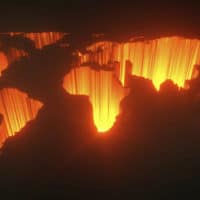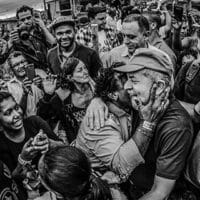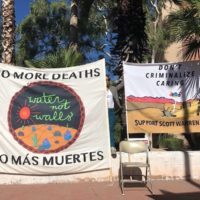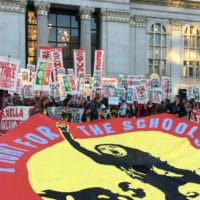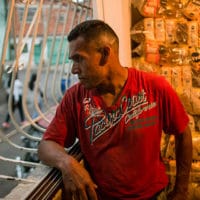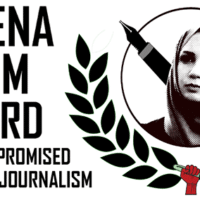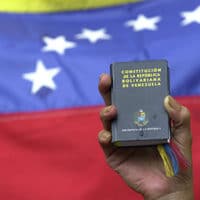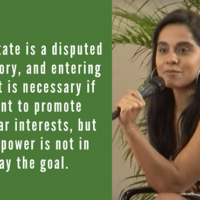-
Marta Harnecker (1937-2019)
We mourn the passing of our dear comrade, Marta Harnecker.
-
Global inequality in a time of climate emergency
Our worlds richest have a great deal of money. They also have the power to decide whether our civilization sinks or swims. So what can we do?
-
Be careful of the crooked smile of powerful people
“For humanity, comrades,” writes Frantz Fanon at the close of his monumental The Wretched of the Earth, “we must turn over a new leaf, we must work out new concepts, and try to set afoot a new man’. Terrible inequalities in our world keep humanity divided.
-
The Unipolar Moment is over
The Russia-China strategic partnership, consolidated last week in Russia, has thrown U.S. elites into Supreme Paranoia mode, which is holding the whole world hostage.
-
Chavez the Radical XXIV: “The Land Belongs to Those Who Work It, not to the Large Landowners”
The latest episode of Tatuy TV’s “Chavez the Radical” focuses on the question of land ownership in Venezuela, an issue that remains at the heart of the struggle in the countryside.
-
Belgium Worker’s Party obtains excellent results in federal, regional and European elections
After a phenomenal and social campaign, the Belgian Workers’ Party (PTB-PVDA) has confirmed its progress throughout the country, with results ranging from 6.6% in Flanders to over 12% in Brussels and 13.5% in Wallonia. The genuine left thus sends 12 members to the federal parliament, 1 member to the European Parliament, 11 members to the Brussels Parliament, 4 members to the Flemish Parliament and 10 members to the Walloon Parliament.
-
To survive: we need a global awakening much bigger than a “revolution,” much deeper than just ending capitalism
The climate apocalypse will soon kill all of us (including the plutocrats), if we don’t take drastic measures right away. But the plutocrats are blocking those measures, because they don’t want anything cutting into their short-term profits. In this video I discuss the crazy culture that has us headed toward extinction. To survive, we need an immense cultural change.
-
Europe has no freedom but to choose “freedom gas”
The U.S. Department of Energy (DOE) recently renamed U.S. liquefied natural gas (LNG) exports “freedom gas.” But freedom for who? For Europe who already has a cheap and reliable source of natural gas, but is being forced to switch over to more expensive U.S. gas under the threat of sanctions? Certainly not. Or freedom for […]
-
Tales of resistance: beyond black and white
On the 20th anniversary of Chávez’s first “Aló Presidente” broadcast, VA columnist Jessica Dos Santos looks back on this revolutionary tool and the current challenges in the communications field.
-
Silvia Federici in conversation with Astra Taylor
What memory can do:
Re-signify the earth
Re-signify the local
Make the struggle visible -
U.S. activist faces federal charges for providing aid to migrants
Scott Warren was arrested in 2018 for allegedly having “harbored” two fatally weakened undocumented migrants in a facility run by No More Deaths
-
They cannot stop us. We will live and triumph.
Yesterday the U.S. Treasury Department added to sanctions announced April 17, and the activation of Title III of the Helms-Burton Act, the prohibition of “people to people” cultural and educational trips, plus others related to travel and transportation services, remittances, banking, commerce, and telecommunications
-
Big lies
Benjamin Carter Hett on what we can learn from Hitler’s rise to power
-
Nine ways scientists can support a people’s Green New Deal
In late 2018, the Green New Deal (GND) vaulted into the center of U.S. politics thanks to Rep. Alexandria Ocasio-Cortez (D-NY) and the young activists of the Sunrise Movement. Since then, the GND has become one of the most hotly debated issues in mainstream politics and has helped inspire an upsurge in climate justice activism and organizing.
-
An Analysis of the 2019 Oakland Teachers’ Strike
The recent seven-day strike by the Oakland Education Association (OEA) was eerily similar in key ways to its 26-day strike in 1996. What happened in both cases was that union members and community allies won on the picket lines and in the streets but got a draw, at best, at the bargaining table.
-
Washington Office on Latin America gets behind U.S. regime change agenda in Venezuela
WOLA’s hawkish stance on Venezuela may seem surprising for a “human rights” organization, but it is less of a surprise for those familiar with WOLA’s history.
-
Black Agenda Report is a proud recipient of the Serena Shim Award for uncompromising integrity in journalism
Serena Shim was born in Detroit. She attended high school in nearby Livonia MI, and graduated from the American University of Science and Technology in Beirut. She was married with two children, and at the time of her death worked for the Iranian news outlet Press TV.
-
Constitution – Title I: Fundamental Principles (Art. 1-9)
Article 1: The Bolivarian Republic of Venezuela is irrevocably free and independent, basing its moral property and values of freedom, equality, justice and international peace on the doctrine of Simón Bolívar, the Liberator. Independence, liberty, sovereignty, immunity, territorial integrity and national self-determination are unrenounceable rights of the Nation.
-
Building socialism from below
The state is a disputed territory, and [entering into it] is necessary if we want to promote popular interests, but state power is not in any way the goal. In any effort to build popular power, there must be synergy between the bottom and the top. The key issue here is that what is done “from above” must strengthen popular power from below.
-
98.3 percent of Ghana’s gold remains in the hands of multinational corporations
Disproportionate focus on corruption of national leaders distracts from the systemic theft of Ghana’s wealth.


